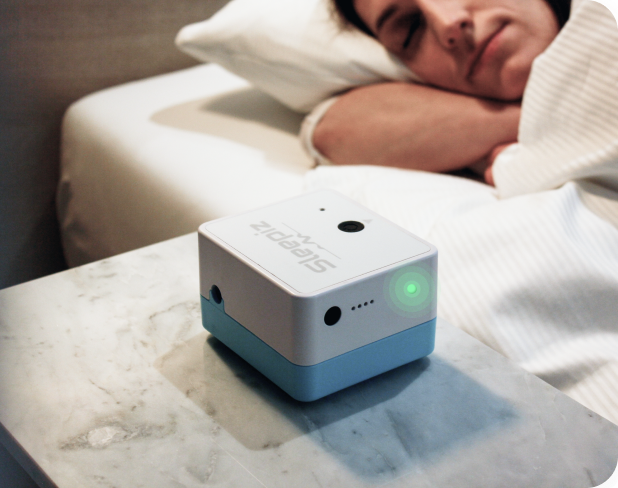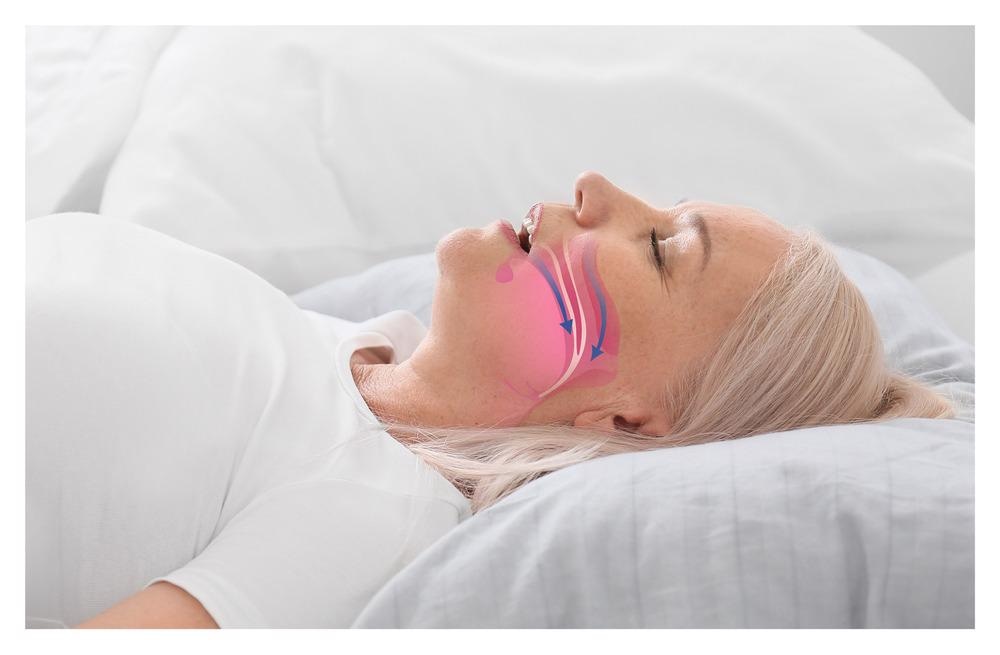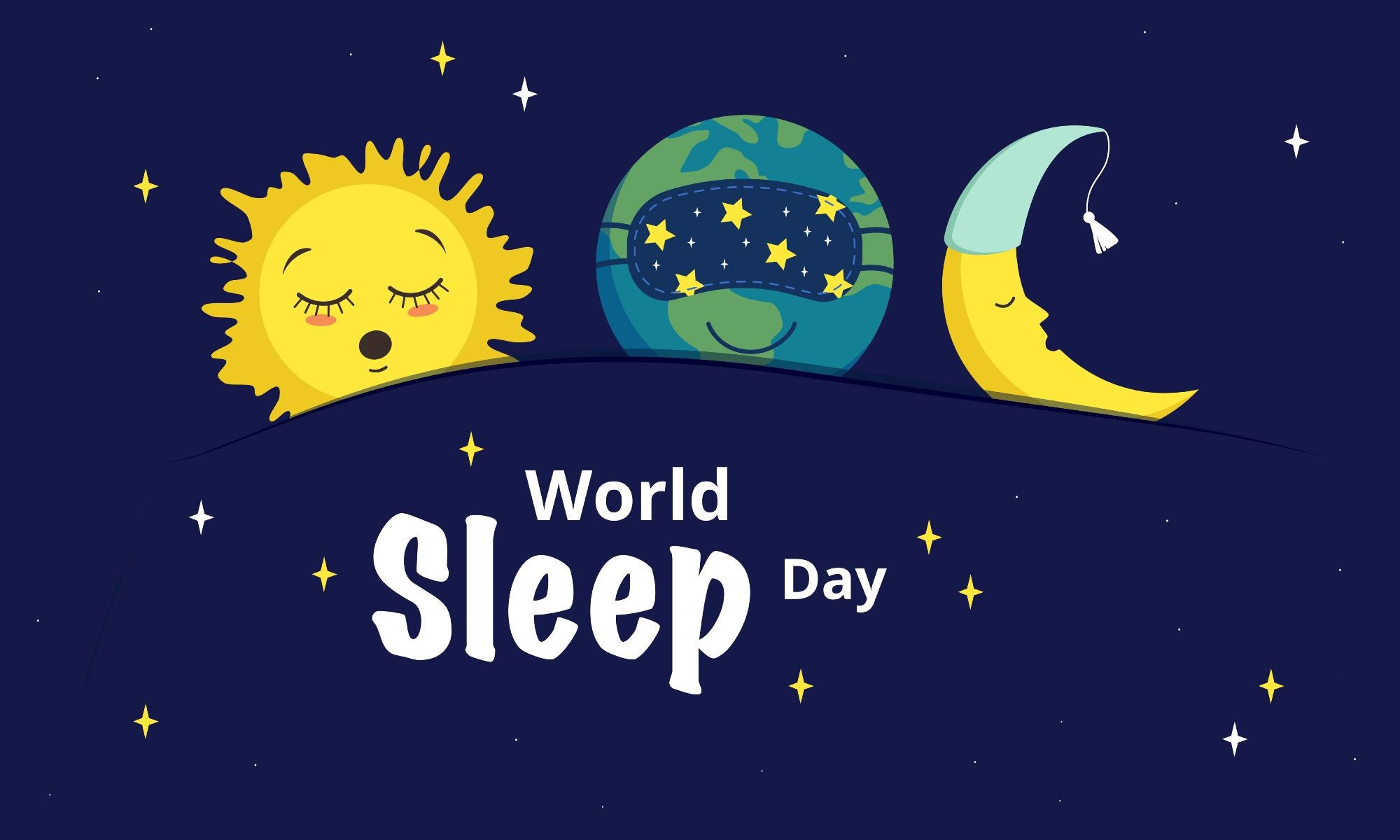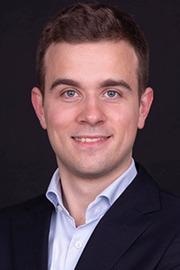My Name is Max Sieghold and I am the Co-Founder and CFO of Sleepiz. At Sleepiz we work with a large team of experts, data scientists, engineers, and medical key opinion leaders in sleep medicine, respiratory diseases, and intensive care monitoring to bring revolutionary technology into patients’ homes.
The mismatch between today’s status quo in medical technology and the amazing potentials in data science and microelectronics inspired us to develop novel approaches in sleep and respiratory medicine to monitor patients at home to improve health care outcomes.
The slogan for World Sleep Day 2022 is ‘Quality Sleep, Sound Mind, Happy World’. What does this slogan mean to you, and how would you define ‘quality sleep’?
We spend one-third of our lifetime sleeping and sleep plays a crucial role in our physical and mental wellbeing. Yet many aspects of our sleep are still poorly understood and not measured. We want to shed light on this huge part of our lives. Quality sleep means 8 hours of regular, undisturbed, and “healthy” (I.e. non-sleep disordered) sleep.

Sleep plays an important role in clearing out the waste in the brain and is also necessary for our nerves and organs to function at their best. Can you tell us more about the crucial role that sleep plays in our health?
Sleep is a biological need for our organism, essential as food, water, and air - our body needs sleep to cognitively and physically restore itself.
It is a fundamental process for our brain. Next to reorganizing, updating, and filtering all inputs collected throughout the day and replacing lost brain cells with new ones during neurogenesis, the brain also needs to “clean itself” during sleep. Our brain produces waste material, which, if not cleared up, can damage our health. When we sleep, a self-cleaning mechanism is triggered - a liquid called cerebrospinal fluid is released and removes toxins built up during the day.
Sleep also affects cardiovascular health. Studies have shown that sleep deprivation can contribute to problems with blood pressure and raise the risk for heart diseases, heart attack, and stroke. Like the brain, the heart rests and reduces stress during sleep. During the non-rapid eye movement (NREM) sleep phase, the heart rate slows down, and blood pressure drops. If a person sleeps less and spends less time in the NREM phase heart recovers is impacted and the risk of cardiovascular diseases increases.
Moreover, Sleep deprivation has a significant effect on the mind. Chronic insufficient sleep may lead to increased irritability, a short temper, less tolerance to stress, raising the risk to develop depression, anxiety, and mental distress.
Chronic lack of sleep has often been associated with metabolic diseases, like diabetes, as well as neurodegenerative diseases, such as Alzheimer’s and Parkinson’s. Please could you explain why prolonged lack of sleep could lead to such outcomes?
Sleep problems, like OSA and Insomnia, appear to have a role in diabetes development. Associations have been found between sleep disorders, insulin resistance, and impaired glucose tolerance, which cause the raising of blood sugars levels, increasing the risk of diabetes.
Sleep deprivation also represents a risk factor for neurodegenerative diseases, such as Alzheimer’s and Parkinson's diseases. Sleep contributes to the removal of harmful proteins such as β-Amyloid and Tau proteins in brain cells. It has been demonstrated that sleep deprivation, even for a single night, leads to an increased deposition of β-Amyloid and Tau proteins in brain cells, which are the key underpinning mechanisms in Alzheimer’s and Parkinson’s diseases.
Sleepiz AG is keen to focus its research on the bedroom rather than through laboratory studies. Why do sleep studies in the lab often face complications, and what are the benefits of researching sleep in a person’s natural sleep environment?
When we sleep in a sleep laboratory, we are in a new environment, often have more than thirty cables on our body, and are being surveilled by camera and audio. Surely, we do not sleep normally in such an environment. Additionally, patients are typically only monitored one night in a sleep lab, this does not allow us to see the full picture about the patients’ sleeping problems and habits.
By monitoring the patient for a prolonged period at home (at least three nights), we can observe the patient in their natural sleep environment and observe variabilities in their sleep disorders and sleep patterns. This allows a much more in-depth picture of what is going on with the patient.

Image Credit: Sleepiz
Using machine-learning algorithms and low-power electromagnetic waves, Sleepiz AG has developed a revolutionary and patient-centered approach for diagnosing sleep apnea. How does the apnea screening platform work, and what are some of the benefits of using a contactless device to measure, monitor, and analyze sleep data?
The system works by detecting micro-and macro movements of the patient during sleep using radar. This means we can detect the breathing patterns, breathing rate, pulse rate, and overall body movement of the patient. This data is then analyzed using machine learning algorithms to identify sleep disorders like sleep apnea, sleep phases, and movement disorders. Additionally, we can observe trend changes in any of these parameters which give us more information about the underlying issues the patient might have.
The benefits are three-fold. Firstly we can monitor in the most natural state, as the patient does not have to wear anything. Secondly, we can monitor over long periods (technically forever), and thirdly we do not require any compliance from the patient, like charging a wearable or remembering to wear something before going to bed. This makes our solution accessible to anyone anywhere.
People with sleep apnea face potential risk factors for cardiovascular disease. Please can you tell us more about the importance of correctly diagnosing and treating sleep apnea, and provide more details into what potential risks occur when sleep apnea is left undiagnosed?
Untreated sleep apnea carries both short-term and long-term risks. In the short run, the likelihood of workplace and traffic accidents increases significantly, next to the impact on quality of life due to daytime fatigue. In the long run, we know that there are causal links between hypertension, cardiovascular diseases, and mental health. For example, a study from Harvard Medical School and McKinsey estimated the cost of mental health of unmanaged moderate-to-severe OSAS to be $3.2-4k per year per patient. Other links to renal failure and depression are established but further research is necessary.
In the current patient pathway we face three problems; lack of awareness in the general population and medical community, bottlenecks in cumbersome diagnosis methods leading to long waiting times and high cost, and therapies like CPAP that have very low patient compliance. By increasing awareness, enabling access to easier diagnostic procedures, and promoting therapies that have higher patient compliance, we can reduce the overall burden of sleep apnea on society.

Image Credit: Pixel-Shot/Shutterstock.com
Chronic Obstructive Pulmonary Disease (COPD) is another prominent and deadly respiratory disease, with 250 million sufferers worldwide, according to the WHO. How can the Sleepiz device also be used to help monitor and manage chronic respiratory diseases like COPD?
COPD patients typically suffer from exacerbations (sudden worsening of the disease) a few times a year, depending on their disease progression. If those exacerbations are not detected early on, they can lead to severe outcomes and hospitalization.
Through respiratory monitoring during sleep one can identify these exacerbations early on, this is because sleep acts as a seismograph of the patients’ overall health, and changes in the baseline vital signs can often be detected the earliest during sleep. This enables earlier intervention and improves patient outcomes through early treatment. This does not only benefit the patient by potentially reducing morbidity but also reduces cost for payors.
How do you believe we can lessen the burden of sleep problems in society, and do you think we can achieve this through better prevention and management of sleep disorders, including sleep apnea and COPD?
We can lessen the burden by educating the population about the importance of sleep on your overall health and about what healthy really sleep means: sleeping 8 hours every night, observing the basic rules of sleep hygiene like regular sleeping times. Additionally, we can raise awareness about the symptoms and available treatments for physiological and neurological sleep disorders.
Enabling patients to access easy-to-use and widely available screening solutions like Sleepiz, allows us to detect problems early on and to treat them with the right therapies. Awareness is rising both in the general and medical population, however, we still have a long way to go. At some point, we hope that sleep health gains the same level of attention as good nutrition or regular exercise.

Image Credit: Katt_Polyakova/Shutterstock.com
What’s next for Sleepiz?
We are looking to expand our services globally. Currently, our products are available in the EU and India. Additionally, we are building more integrated services for patients, such that we can accompany them not only in screening, diagnosis, and monitoring but also in therapy and disease management.
Where can readers find more information?
About Max Sieghold
I am the CFO and Co-Founder of Sleepiz. I lead the financial and business development aspects at Sleepiz.
I hold a master’s degree in finance and Accounting from the University of St. Gallen and have worked in Global Marketing of medical devices before founding Sleepiz.